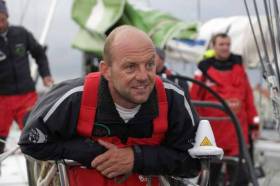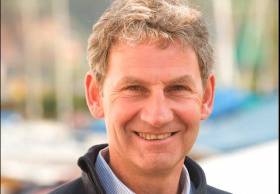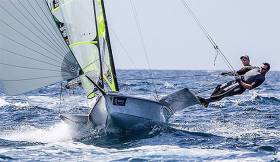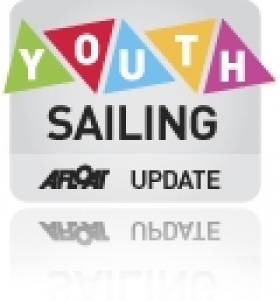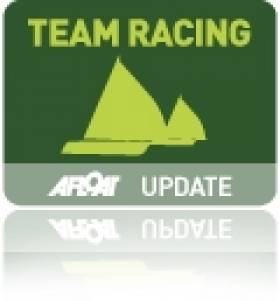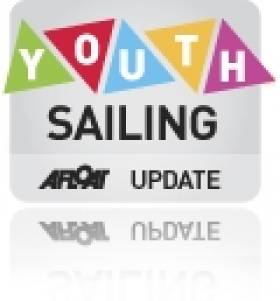Displaying items by tag: RYA
Britain's former Olympic sailing coach is presented with a boats.com / YJA Special Award for services to the sport.
Stephen 'Sparky' Park has been presented with a boats.com/YJA Special Award for services to the sport of sailing. The award was presented by Barry Pickthall, Chairman of the Yachting Journalists' Association and former Chairman Bob Fisher at a lunch held at the Royal Southern YC this week
Park has been the s Olympic Team Manager for the last four Olympiads and led Britain's world-beating sailors to amass an unprecedented 23 Olympic and Paralympic medals during this period.
Olympic sailing medalists Giles Scott, Iain Percy and Paul Goodison all sent video messages from Bermuda where they are training to compete in the America's Cup starting on May 26, and Helena Lucas, who won Gold and Bronze medals under Park's management at successive Paralympic Games, was equally effusive during the lunch.
Dave Williamson, Chairman of the Royal Yachting Association sent a message of appreciation: "Sparky - what a career so far! Scots Youth Squad sailing 420s in the early '80's, Welsh Yachting and then the Royal Yachting Association, ending up as Olympic Manager during four Olympiads. There was a potential for 51 medals, so if medals are a measure of success, his Team GBR achieved a 45% rate. At the Rio Games, Team GB finished top sailing team when every crew qualified for their medal race. Very few sports coaches have achieved this measure of success.
Always focused and forthright, it has been a privilege to know Stephen and have him as a prominent member of the RYA team."
Rod Carr, the former CEO of the Royal Yachting Association, now Chairman of UK Sport, added his thoughts: "Determined, resourceful, focussed and unfazed by the vagaries of racing are my abiding memories of 'Sparky'...A great job, well executed."Park has been recruited to lead Britain's Olympic cycling team where he will introduce some of the coaching methods developed during his time in sailing.
Former Irish Green Dragon VOR skipper Ian Walker is to take up the Director of Racing position at the Royal Yachting Association this autumn, according to PBO.
The double Olympic medallist, America’s Cup sailor and Volvo Ocean Race-winning skipper will take up the baton from John Derbyshire OBE, who is set to retire later this year after 32 years’ involvement with the organisation, including 16 years in the Director of Racing role.
Walker has enjoyed an impressive and multi-faceted career in the sport, winning two Olympic silver medals (470 in 1996; Star in 2000) and coaching Shirley Robertson, Sarah Ayton and Sarah Webb to Yngling gold at Athens 2004.
Among a host of inshore and offshore racing successes, Walker has been involved with two America’s Cup campaigns (GBR Challenge in 2003; +39 in 2007) and won the 2014/15 edition of the Volvo Ocean Race with Abu Dhabi Ocean Racing. Prior to that he raced for Ireland as skipper of Ireland's Green Dragon project.
More from PBO here.
Sea Change for RYA Racing as Derbyshire Announces Retirement
John Derbyshire OBE, whose involvement with the RYA’s Racing programmes spans some 32 years as a coach, Olympic Manager and as latterly Director of Racing, is to retire from the organisation in late 2017.
Two exciting opportunities will now exist for two exceptional people to help shape the future of sail racing in the UK and the medal fortunes of the world’s leading Olympic sailing nation.
With Olympic Manager Stephen Park OBE also moving on this spring, the RYA is seeking two outstanding candidates to lead the development of racing in the UK, the World Class Programme and the British Sailing Team for the Tokyo 2020 cycle and beyond.
Derbyshire first joined the RYA as National Racing Coach in 1985 – coaching Finns, Europes and Lasers until 1996, whereupon he became Olympic Manager for the Sydney 2000 cycle. Sydney was the first Games following the introduction of National Lottery funding for sport and one which saw Britain’s biggest performance improvement at any sailing Games.
Derbyshire was also personal coach to Sir Ben Ainslie from 1994-2000, including at Sydney where Ainslie won the first of his four Olympic gold medals, and coached other notable sailors such as Shirley Robertson, Iain Percy, Andrew Simpson and Hugh Styles during his career.
Since 2001 he has been the Director of Racing, overseeing the RYA’s World Class Programme and talent pathways, as well as the broader remit of racing participation in all its forms in the UK.
Following a staffing review, the RYA will look to recruit its new Director of Racing as a first priority to enable a suitable handover period, and to allow the successful candidate to be involved with the recruitment of an Olympic Manager to succeed Park.
“It had always been my intention to retire in the early part of this cycle, and with a new Olympic Manager to recruit as well it makes logical sense for my successor to be involved in that process to ensure the best possible handover,” explained Derbyshire, who will remain full time in post until 1 September 2017.
“I feel hugely proud of what has been achieved during my time with the RYA. The sport has evolved enormously during that period and it’s been a privilege to have led a programme which has helped develop the talents of countless sailors at many levels and in so many facets of the sport, and which has been so dominant on the world stage for so many years.
“I’ve been incredibly fortunate to have been aided in that task by an immensely committed group of athletes, coaches, support staff, officials and volunteers who are so passionate about the health and continued success of the sport in this country.
“The RYA’s World Class Programme is in great shape, with a wealth of talented sailors, coaches and support staff and a favourable funding award from UK Sport to underpin our performance strategy for Tokyo 2020 and beyond.”
UK Sport Director of Performance Chelsea Warr said: “John’s contribution to the success of the RYA’s World Class Programme over a long period of time has been enormous.
“He will be greatly missed by all of us working across the UK high performance system but he will leave a great legacy that will see the sport build on the strong foundations he has laid.
“I am delighted that John will remain in post until September to ensure the best possible handover that will support the new individuals coming in as they look to ensure further success in the Tokyo cycle.”
RYA CEO Sarah Treseder added: “John’s contribution both to British sailors’ medal fortunes and to the standard of UK racing both domestically and internationally cannot be understated, and his experience and insight will be greatly missed.
“I am delighted that we will continue to have the benefit of his experience during this transition period, and would like to place on record our thanks to John from the RYA and the wider sailing community for so many years of dedicated service to the sport.
“Both John and Sparky together have driven forward challenging programmes capable of delivering over successive years and cycles.
“Exciting opportunities now exist for two new individuals to take up their batons, further develop and refresh our Racing programmes and ensure this success continues in the years to come.”
Role descriptions and application details for both the Director of Racing and Olympic Performance Manager roles are available on the RYA website.
Requests for initial confidential conversations in connection with these posts should be sent to Dawn Brown: [email protected]
Strong Family Theme At RYA Scotland Annual Awards
The boating community from around Scotland gathered on Saturday evening (28th January 2017) at the Glasgow Science Centre as RYA Scotland recognised the achievements and outstanding commitment of Scotland's volunteers, coaches, instructors, officials, clubs and performance sailors.
The theme throughout the evening returned to the boating 'family' as the support network that enables the vast range of activity represented across the ten award categories.
Among the highlights was the Performance of the Year category which was won by Daniel Smith from West Kilbride, for his result in the Clipper Round the World Race in which he led the crew of Derry~Londonderry~Doire crew to 2nd place overall. His team won a hat trick of back to back wins in the Pacific and remained on the podium 7 times in the 14 race series.
The Performance category demonstrated the wide range of competitive sailing from ocean racing, day boat racing and Olympic sailing who all merited nominations. Luke Patience, double Olympian and Silver Medallist in the 2012 Games spoke later in the evening.
Skye Sailing Club was awarded the RYA Scotland Club of the Year award for their recent investments in the club and commitment to the local island community within the past year.
The Volunteer of the Year Award went to Billy Fortieth of Oban SC for his lifelong dedication to support both the club and the local RNLI.
The Elizabeth Mackay Award for female endeavours in sport went to Bess Homer of Dalgety Bay Sailing Club.
The entire team from Dalgety Bay Sailing Club were nominated in the Instructor of Year awards demonstrating the community within Bess's club but the award went to Team 15 Windsurfing instructor Calum Nicol.
Among the other awards in the training network Alasdair Young originally from Tarbert, Loch Fyne took the coach of the year award for his creative coaching techniques with the Class Academies and in clubs.
The RYA Scotland Official of the Year went to Tom Thurlow. Currently Tom is also an instructor on Cumbrae.
RYA Olympic Sailors Get £26m Sport Funding For Tokyo Campaign
The Royal Yachting Association (RYA) has responded to a UK Sport Funding announcement for sailing, which will underpin the sport's World Class Programme there for the 2017-2020 Olympic cycle.
As a multi medal-winning sport for the fifth consecutive Olympic Games and top nation at the Rio 2016 Olympic sailing competition, the UK sport has been granted 'Band 1' status and £26.231 million to support its performance efforts towards Tokyo 2020.
In the Rio cycle, Belfast–based Olympians in the 49er class, Ryan Seaton and Matt McGovern, from Ballyholme Yacht Club, benefitted from RYA Northern Ireland funding as well as Sport Ireland funding from the Irish Government. The pair have now split and are both pursuing separate skiff campaigns for Tokyo.
"We're proud that sailing once again delivered against its medal targets and contributed towards a hugely successful British performance at Rio 2016 which captivated the nation and inspired a new wave of aspiring young athletes and sailors," said RYA Performance Director John Derbyshire.
With sailing not currently on the Paralympic Games programme for Tokyo 2020, the sport is not eligible to receive a World Class Programme Paralympic funding award. The RYA will, however, continue to invest strategically in racing at selected Sailability and regional High Performance Clubs with the aim of developing racing participation and supporting World Sailing towards having the sport reinstated for the 2024 cycle.
The RYA shares the global concern over events which transpired to prevent the Israeli team from competing at the recent Youth World Sailing Championships in Malaysia.
At the same time, it is encouraging to see the international show of support for the young athletes concerned who have missed out on the opportunity of World Championship competition for reasons outside their control.
The World Sailing constitution is unequivocal that the sport is to be open for participation by all, on equal terms, without regard for race, religion, or any other factor.
The obligation to uphold this principle applies to all Member National Authorities and is especially important in events involving future generations of sailors. Investigation
As such, the RYA asks that the investigation be swiftly and thoroughly concluded, and its findings shared transparently with the full World Sailing family.
RYA Youth Nationals Underway in Weymouth
#youthnats – The RYA Youth National Championships kicked off yesterday with racing for all classes at the Weymouth and Portland National Sailing Academy. A single Irish crew is competing in the 56–boat 29er class. An Irish Youth Nationals, expected to attract 200 boats – the bulk of which will be Optimist and Laser dinghies – is being staged at the Royal Cork Yacht Club this week.
The day in Weymouth started with a short postponement ashore before sailors headed out for their first race around 11am. The light sea breeze remained in the harbour for the rest of the day. A dying and unstable breeze in Weymouth Bay meant that the schedule was not completed on the 420, Spitfire and Radial boys' courses.
Consistency was key across the race courses, and those who mastered the shifty sea breeze have taken the advantage on day 1.
RS:X
A hat-trick of firsts started Dan Wilson's Youth National Championship title chase with a bang. The RS:X sailor led from the start of each race and protected his lead around the course.
Wilson looks to do much of the same as the week progresses: "I'm hoping to continue the rest of the week where I left off today, just getting the start nailed and pushing forward from there. Once you get the first beat out of the way it's just trying to protect what you have, so I will be hoping to do that this week."
Younger sister, Emma Wilson and Emily Hall sit on ten points in second and third respectively, both scored a second, third and fifth however Wilson pips Hall on countback.
29er
Favourites coming into the Youth Nationals, Dan Venables and Patrick Keech proved their dominance in the 29er class picking up double wins in racing today.
The pairing are already on the hunt for a EUROSAF Youth Europeans spot and are very happy after day 1: "It is a great start to the week, two bullets in two races especially considering it was quite gusty and shifty. It's the best start to the qualification process for the EUROSAFs this year, and hopefully we will keep it going for the rest of the week."
In the 29er yellow fleet Bobby Hewitt and Harvey Martin also had an excellent opening day, picking up a win in the first followed by a second. The 15-year-olds, who transitioned into the 29er this year and are the 2014 RS Feva World and European Champions, were thrilled with their first day.
"It's been a really good day, we were leading from the start in the first race and we just played the shifts up the beat and it was easy from there," said a smiley Martin.
"The second race didn't start so well, we were buried off the line but managed to get it back up the first beat, rounding mark one in fourth then fought the rest of the way to finish second."
Winning the second yellow fleet race of the day were all girl team Hannah Bristow and Emily Covell. Bristow, also a previous RS Feva World Champion, paired up with Covell a year ago and they have spent the winter training in the 29er Transition Squad.
The girls thrived in the gusty conditions: "It was a sea breeze day, a lot of mixing. The wind was shifting right throughout the day and was quite gusty. We were just making sure we were squeezing every gust and getting all the power we could get out of the boat." Explained Covell.
Laser
Henry Wetherell and Michael Beckett took all three of the race wins today. Wetherell claims the advantage with double firsts and a third finishing the day on five points to Beckett's six.
Although Beckett didn't win all three races he acknowledged his consistent start to a long week: "It was a one track race course and so once you figured that out it was just a question of working around the fleet. It couldn't have been much better for me but it could have been much worse, I'm happy."
Radial
The Laser Radial boys' fleet only managed to finish two of their scheduled three races. Jack Cookson and Daniel Whiteley stole the show in the two races sailed, both with a one and two to their score lines.
Both were pleased with their results: "My first day was really good, quite consistent and I was pretty quick around the race course." Said Whiteley.
After disappointing starts to both races, Cookson used his downwind speed to the advantage and sailed back through the fleet, pipping Whiteley to take line honours in the last race of the day.
Light wind specialist, Karyna Manuel ends the day in pole position in the Laser Radial girls' fleet. Similar to other race courses, consistency was the name of the game for the Radial girls' and Manuel takes the early lead with a six point advantage over rival Hanna Brant. Other race winners of the day, Clementine Thompson and Ellie Cumpsty sit further down the pack after both picking up a starting penalty.
420
Max Clapp and Ross Banham won the first and only race on the 420 course. The pair led up the first beat after a successful start, however they lost their lead to Martin Wrigley and Marcus Tressler after sailing to the wrong mark. With impressive boat speed Clapp and Banham regained the advantage up the second beat and held until the finish, winning by only a couple of boat lengths to Wrigley and Tressler.
Spitfire
The Spitfire class also only had one race. Eddie Bridle and James King took advantage of the tricky sea breeze conditions and crossed the line ahead of Sam Barker and Victoria Akhurst in second. Alex Philpott and Jess D'Arcy completed the podium in third.
Warning signal for the first race today is at the earlier than scheduled time of 10.25am for the 29er blue fleet. You can watch the live streaming from the Harbour course on the sportsXstream website. GPS tracking will also be live for all courses on the sportsXstream class pages.
RYA National Team Racing Championship Won By Hoosiers
#teamracing – The Royal Forth Hoosiers (Tim Saxton, Rob Friend, Mark Powell, Isobel Walker, George Clark, Holly Scott) were worthy winners of the RYA National Team Racing Championship hosted by the UK Team Racing Association and Rutland SC on 21/22 March.
24 of the best team racing teams from across the UK were competing at the event, including the recently selected GBR squad for the forthcoming ISAF Team Racing World Championship, which is also being hosted by Rutland SC in July.
The competition started in a fresh, force 4/5 breeze on Saturday, necessitating the use of cut down mainsails on the fleets of 12–foot Firefly dinghies.
The first stage of the Championship consisted of four, seeded leagues, each comprising six teams. After 60 races, the fleet was reclassified for the second stage into Gold, Silver and Bronze leagues of eight teams.
The Championship was decided on the results of the second stage races that had been sailed. The Hoosiers were convincing winners, having not lost a race throughout the competition, and were presented the Prince Philip Trophy.
The next major team racing competition will be the Wilson Trophy (the unofficial British Open Team Racing Championship), which is being hosted by the West Kirby SC on the Wirral, near Liverpool, on the 8-10 May 2015.
More here
#ryajob – The Royal Yachting Association in Northern Ireland (RYA NI) is seeking to appoint an Active Clubs Coordinator. The purpose of this role is work in partnership with RYA clubs and training centres to create and implement sustainable introductory and regular sailing and windsurfing activity. The successful applicant will work with RYA clubs and training centres to assist them with developing innovative initiatives and interventions to increase club membership and to create a range of training, learning, education and capacity building opportunities for coaches and volunteers. Closing date for applications is 4pm on Thursday 26th March 2015. More here
Last Call For RYA Youth Nationals Entries
The countdown to the 2015 RYA Youth Sailing National Championships is well underway, with just six days left to enter the premier annual event for the UK's young sailing talents.
Competitors have up until Sunday 22 March to sign up for the regatta (4-10 April), where racing will take place on the famed Olympic and Paralympic waters of Weymouth Bay and Portland Harbour, and where RYA Youth National Champions will be crowned across six classes.
Racing will take place for under 21-year-old boys in Laser Standards, girls and boys in Laser Radials and Neil Pryde RS:X 8.5 windsurfers, and for all-boy, all-girl or mixed crews in 420s, 29ers and Spitfire catamarans.
The event also doubles up as a selection event for the British Youth Sailing Team to compete at the EUROSAF Youth European Championships in Brest, France (26 July-2 August), and will determine invitees for the British Youth Sailing Team Selection Event for the ISAF Youth Sailing World Championships, to be held at Hayling Island Sailing Club from 29-31 August 2015. The 2015 ISAF Youth Worlds is to be staged in Langkawi, Malaysia, from 27 December-2 January.
To enter the event and for further information click here



























